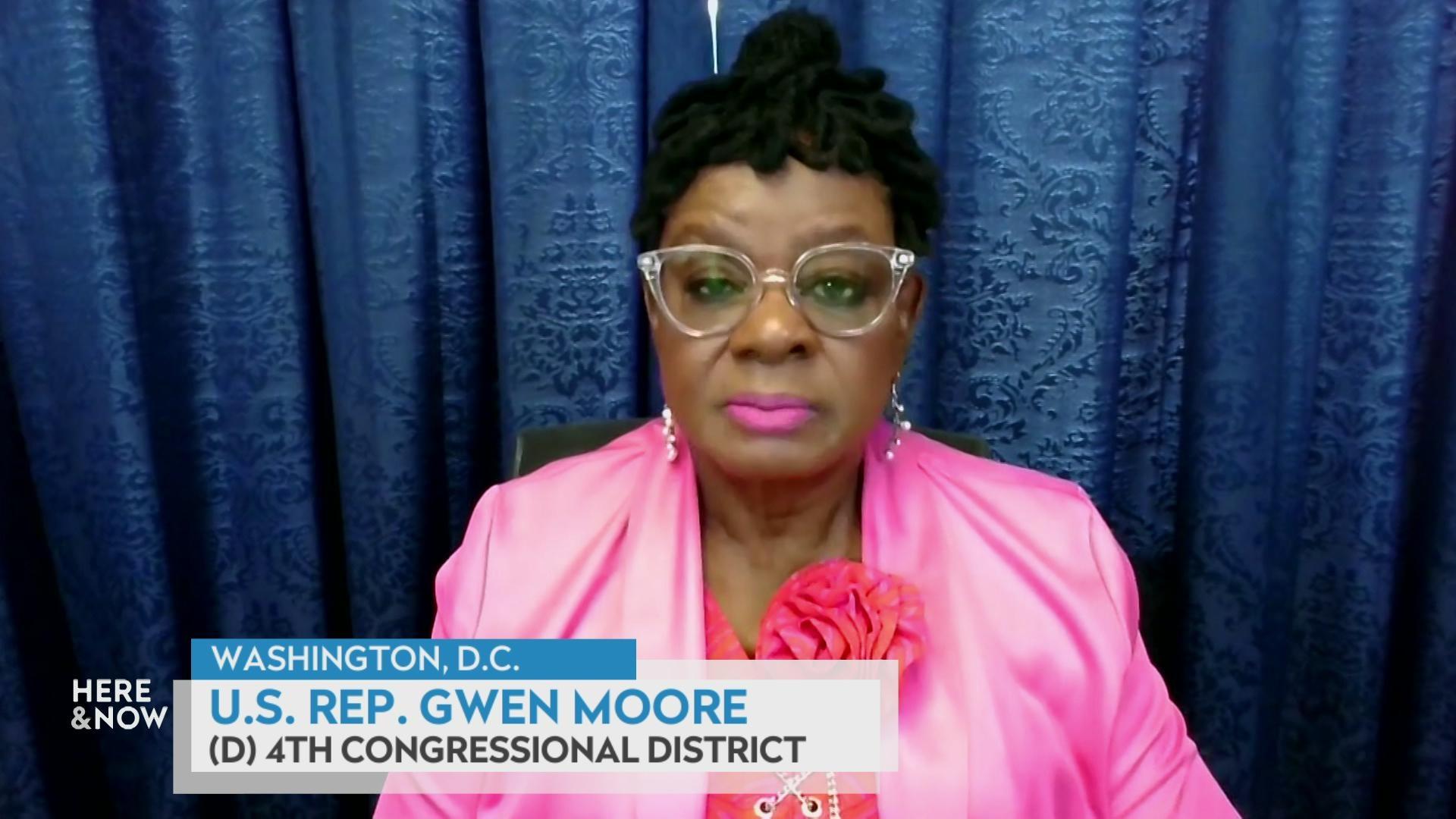Sen. Tammy Baldwin on passing the Respect for Marriage Act
By Frederica Freyberg | Here & Now
December 2, 2022
Democratic U.S. Sen. Tammy Baldwin discusses the chamber's vote for the Respect for Marriage Act to enshrine same-sex and interracial marriages in federal law and why she seeks these protections.
VIDEO TRANSCRIPT
Frederica Freyberg:
Landmark legislation passed the U.S. Senate on a bipartisan vote this week. The Respect for Marriage Act ensures that same sex and interracial marriages are enshrined in federal law. The bill passed 61 to 36 on Tuesday including support from 12 Republicans. Not among them, Wisconsin's other senator, Republican Ron Johnson. In a statement on his no vote, he said in part, "The Democrats continue to use this to create a state of fear over a settled issue in order to divide Americans for their political benefit. The substitute amendment," he said, "did not provide sufficient protection for those with strongly-held religious beliefs." The Chamber's first openly gay Senator, Wisconsin Democrat Tammy Baldwin was lead sponsor. She joined us earlier from Washington. Senator, thank you very much for joining us.
Sen. Tammy Baldwin
My pleasure.
Frederica Freyberg
So how meaningful is it to you that the Respect for Marriage Act passed the Senate this week?
Sen. Tammy Baldwin
Well, it's meaningful on so many different levels. I will start with the fact that I have heard from so many who are expressing gratitude because they have been seriously worried about the future recognition of their marriages because of the threat that hangs over it after the Dobbs decision of the U.S. Supreme Court earlier this summer. And just countless individuals have said how much it means to have a little bit more peace of mind now that the Respect for Marriage Act is headed towards being signed into law by President Biden. It's also meaningful in I think, a sort of bigger arc of history way, if you will. This vote would've been unimaginable just a decade ago. That's not where the Senate was. That's not where the Congress was. That's not where the people of the United States were. And what we've seen since marriage equality became the law of the land in 2015 is that there's nary a person around in Wisconsin or America who doesn't know somebody who's been impacted and benefited by marriage equality. It might be a neighbor, it might be somebody you go to church with, it might be a staff member, a colleague, a family member. I mean, it is now hard to imagine, you know, not knowing somebody who has been impacted, couples and families. And so I think hearts and minds have changed. In fact, I know that that's the case. 70% plus of Americans and Wisconsinites support marriage equality. And I guess we're gaining on those numbers. In the U.S. Senate, we had at least 61 out of 100 join together to pass the Respect for Marriage Act. And that says a lot about where we're moving as a country.
Frederica Freyberg:
What precisely does the act provide for gay or interracial married couples?
Sen. Tammy Baldwin:
Yeah, so if either of the Supreme Court rulings that protected same-sex marriage or made same-sex marriage the law of the land or made interracial marriages possible in every single state, if either of those cases were to fall it would require that states, regardless of what their state law or constitution says, would have to respect and honor through the Full Faith and Credit clause of the U.S. Constitution, marriages that were valid where entered and when entered. So for example, in a state like Wisconsin where we have a constitutional amendment banning same-sex marriage, Wisconsin would nevertheless still have to recognize any valid same-sex marriage that was entered into either in Wisconsin when it was legal, right, or in another state where it is or was legal. And the other thing that the Respect for Marriage Act does is repeal the 1996 federal act called the Defense of Marriage Act. That created a federal barrier to recognition of same-sex marriages. It's still on the books and it's been rendered toothless by the Supreme Court in their marriage equality case Obergefell. But it's still on the books. And so this gets rid of it, it will be off the books.
Frederica Freyberg:
How, in this hyper-polarized political landscape, did you get the Republican votes to get here?
Sen. Tammy Baldwin:
Well, I think there were a number of different ways, and frankly, you know talking to Republicans who wanted to get to yes but listening carefully to what their concerns and questions were and being able to work with some Republican colleagues on crafting language to clarify answers to their questions. So let me restate that I think a huge difference has been made that I don't have any republican colleagues who don't know a gay couple, a lesbian couple, who don't understand what marriage equality has meant in America. So there were a number that I could talk with who wanted to get to yes. Many times the issues were around religious liberty and just wanting clarification that the respect for marriage doesn't change anything. That all the religious liberties that individuals and organizations currently enjoy don't change because we passed the Respect for Marriage Act and we were willing to basically put that in writing. And I think that brought the coalition to the numbers we needed to pass the bill.
Frederica Freyberg:
What is your comment on Wisconsin's other senator, newly reelected Republican Ron Johnson's no vote on this?
Sen. Tammy Baldwin:
Well, I mean obviously, you'd have to ask him. He was on all sides of this issue, which was quite puzzling. I know early on he talked with the Wisconsin Reporter and said he saw no reason to object to it, to not pass it. And then went through lots of machinations, in particular, I think citing some of the religious liberty concerns that some of my other Republican colleagues voiced. But we were able to fashion a response to that that led to the endorsement of this broad coalition of faith-based organizations including the Church of Jesus Christ of Latter Day Saints, the Seventh Day Adventists, a coalition of evangelical churches a group that represents Christian colleges and universities, Orthodox Jews. I mean, this was an amazing coalition who was saying, "Look, having these religious liberties clarified and to clarify in the bill, that this is status quo. We're not changing anything other than making sure that couples in interracial relationships and marriages and couples in same-sex marriages will not have to worry and fear that they lose the rights and responsibilities conferred with marriage should these cases be reexamined and overturned by the Supreme Court."
Frederica Freyberg:
And yet, if you had your druthers, would there be that kind of conscience clause exemption to the act on religious grounds?
Sen. Tammy Baldwin:
Again, it restates current law. There's no expansion of law or contraction of law other than the Respect for Marriage Act that we've already talked about. But I think if this helps people, you know, oftentimes with one of my Republican colleagues, just wanna have something in the bill that they could point to and say, "See this protects the liberties that we have." And if that's what it takes, I think it was well worth restating current law.
Frederica Freyberg:
How significantly, you spoke to this a little bit earlier, but how significantly has public opinion on gay marriage changed over your years as a lawmaker?
Sen. Tammy Baldwin:
Yeah, I think of, you know, many, many years at various levels of government fighting for some sort of relationship recognition. In the early days it was domestic partnership legislation or civil unions or anything that allowed same-sex couples to be able to protect their families. You know, like for issues like hospital visitation. You know, prior to marriage equality if you went to see a loved, your partner, your life partner, in an emergency room after an accident you would be a legal stranger and you would be barred access. So, you know, whether it's insurance coverage or parental rights, all of these things that flow from a marriage certificate and recognized marriage. Fought for so long. These are serious rights and responsibilities that flow from marriage that people really needed in order to protect their families the way others could. And I think that the American public as they saw more and more families, like, "You're not so different than we are, right? You want the same things and that is to protect your family." And I think that public opinion shift was really tremendous in terms of helping us also be able to see that reflected in the House of Representatives and the United States Senate.
Frederica Freyberg:
Now, we know the bill goes back to the House for a final vote before the President signs it. But what more is left to do in your mind on behalf of LGBTQ citizens?
Sen. Tammy Baldwin:
Well, this very discussion does remind us that we need to take the extra steps of reexamining our state laws and our state constitutions. You know, I mentioned that this bill covers interracial marriage also. When the case striking down bans on interracial marriage was decided in 1967, a case called Loving versus Virginia, 16 states in America still had statutory bans on interracial marriage. And it took until the year 2000 for the last state to repeal their ban on interracial marriage. The year 2000. We have work to do to address these repeals of these bans of same-sex marriage in the States including by amending our constitution in Wisconsin. But on the broader question, you know, at the same time that we're celebrating the passage of the Respect for Marriage Act, we know that record numbers of anti-LGBTQ legislation, particularly focused on transgender individuals, transgender youth in particular, are being introduced in state legislatures across America. And that rhetoric exists also on Capitol Hill. There's a lot of work yet to be done to achieve full equality, full equity, and that work, it remains ahead of us.
Frederica Freyberg:
What will it be like for you to see this act signed into law?
Sen. Tammy Baldwin:
I think I might get a bit choked up. I already have been. It's, you know, I know it's gonna make a difference. I know how many people just were resting a little bit easier upon Senate passage knowing that this was almost certainly going to become law and the worries that people have had since mid-summer when the Supreme Court reversed a precedent that everyone thought was well settled and said that that the Roe versus Wade decision was erroneously decided. And then you look at all the other legal decisions that were based on the same constitutional provisions with legal reasoning that was highly similar including these marriage cases and said "Oh my gosh, what's next?" So there are a lot of worries that have been put to rest, and that's making a difference.
Frederica Freyberg:
Senator Tammy Baldwin, thank you very much.
Sen. Tammy Baldwin:
Thank you.
 Passport
Passport











Follow Us